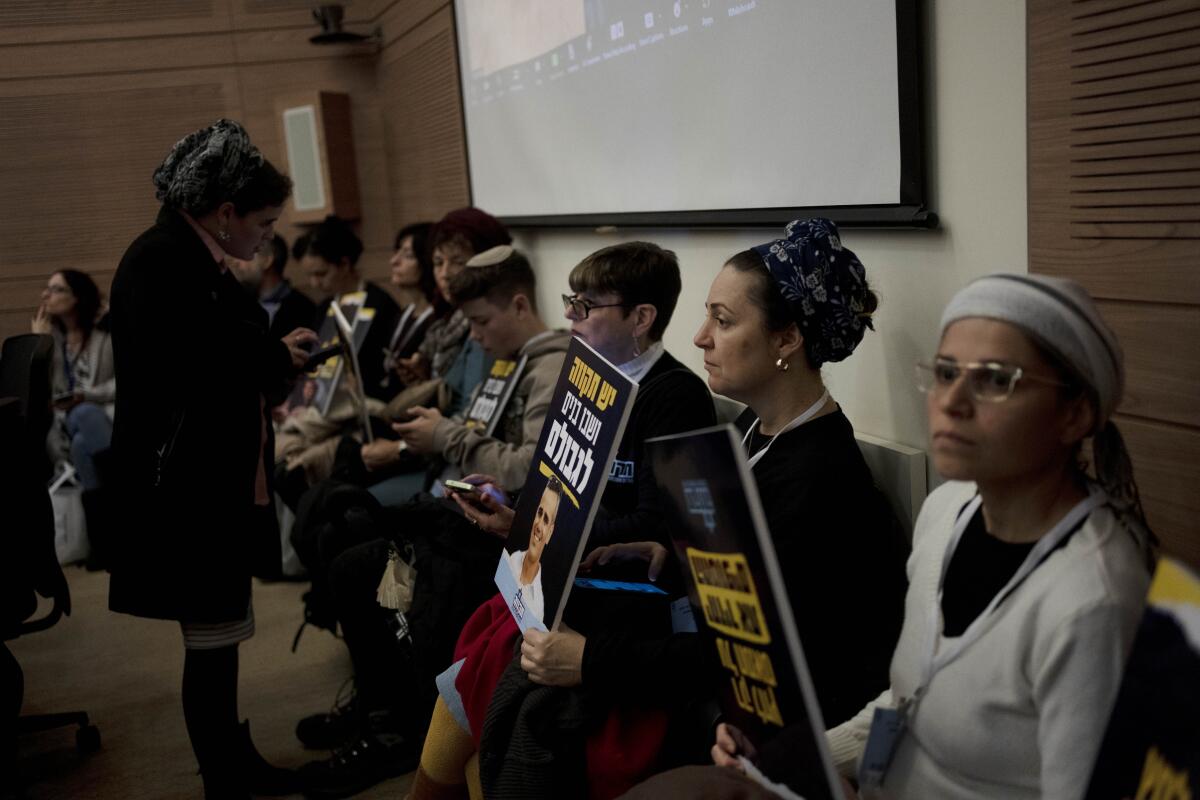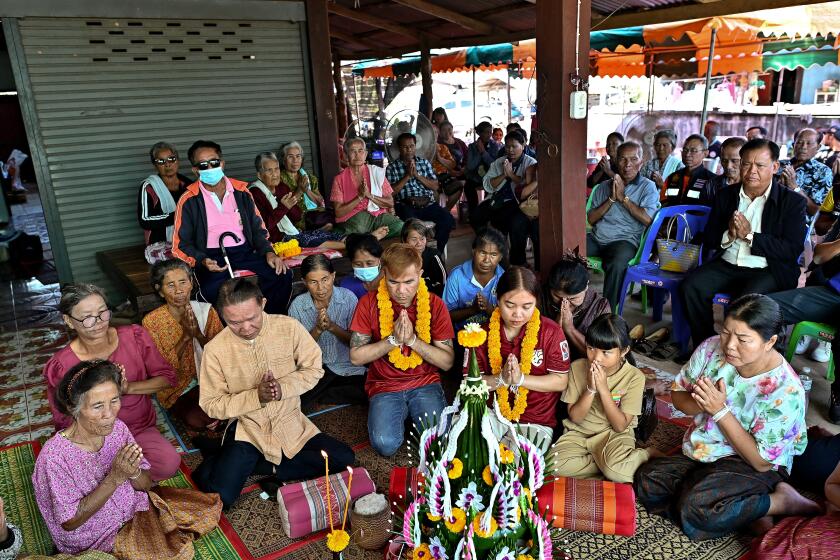The families of a few Israeli hostages don’t want a deal to bring them home. They want Hamas crushed

- Share via
JERUSALEM — Chants of “Now! Now! Now!” ring out at nearly every protest in Israel imploring the government to do everything possible to win the immediate release of dozens of hostages held by Hamas.
But a small group of hostages’ families is pushing a different message: Let the army first finish the job of defeating the militant group, even if that delays the return of their loved ones.
These families argue that the price to be paid in any hostage deal — the release of large numbers of Palestinian militants held by Israel — would endanger the country in the future.
“When you release terrorists, they will return to murder. That’s how it has always been,” said Tzvika Mor, whose son Eitan, 23, was abducted four months ago from the Nova music festival, where he was working as a security guard.
“How can you stand in front of people and say, ‘I want my son back, and I don’t care about you?’” Mor told the Associated Press by phone. “Instead of us only worrying about our son, we are concerned for the whole country.”
Most of the hostages’ relatives sharply disagree with Mor, saying that only a deal can free the captives and that their chances of survival are increasingly dim given the dangerous conditions in Gaza. Those fears were heightened late Wednesday when Israeli Prime Minister Benjamin Netanyahu rejected the latest Hamas demands for a hostage deal as delusional and instead vowed to pursue war until “total victory.”
The hostages’ plight has captured the Israeli public’s attention since they were seized during the Oct. 7 attack by Hamas on southern Israel that sparked the war. Posters of the captives are plastered on city streets, and many Israelis now wear necklaces with symbolic military-style dog tags and small yellow ribbons in solidarity with them.
Protests calling on the government to reach a deal with Hamas have grown in size and intensity as the crisis has dragged on. And fearing that time is running out to bring them home safely, protesters have grown increasingly vocal — in some cases grabbing microphones and letting out blood-curdling screams.
Mor said he knows his opinion is “different from what’s acceptable” and is even viewed as unnatural. In December, Alon Nimrodi, the father of hostage Tamir Nimrodi, told Mor during a live show on Israel’s Channel 11, “just because you gave up on your son, doesn’t mean I will give up on mine,” causing Mor to break down in tears.
The Mor family and two other hostages’ families founded the Tikva Forum, a loosely organized group whose public members are mostly religious and right-wing. They share the belief that military pressure, not an immediate cease-fire or hostage release deal, is the best way to bring their loved ones home.
Mor said his critics can’t understand how he could put his ideology above the natural response to seek the safe return of loved ones. He and others in the forum say they are being rational and that their critics are being led by their emotions.
Approximately 250 people were taken hostage during the Oct. 7 attack in which Hamas also killed about 1,200 people, mostly civilians. Israel’s ensuing war on Hamas in Gaza has killed more than 27,000 Palestinians, two-thirds of whom are women and children, according to health officials in Gaza, where Hamas continues to hold sway in some areas.
For a Thai farmworker taken hostage by Hamas militants Oct. 7, memories of Israel and Gaza are of love, grief and heartbreak for those she left behind.
During a weeklong cease-fire in November, approximately 100 hostages were released in exchange for 240 Palestinian prisoners, mostly women and children who had been convicted of minor offenses.
In its latest demands, Hamas is seeking the release of hundreds of Palestinian prisoners, including those convicted of killing Israelis during the long-running conflict, in exchange for freeing all the hostages.
That’s unacceptable to the Tikva Forum, whose views hew closely to Netanyahu’s.
“Surrendering to the delusional demands of Hamas that we have heard not only won’t lead to the release of the hostages, it will invite another massacre,” Netanyahu told reporters Wednesday.
Netanyahu’s words were devastating for the vast majority of hostages’ families.
“I’m extremely scared that if you continue along this path … there won’t be any more hostages to release,” said 72-year-old Adina Moshe, who was among the hostages freed in November, referring to Netanyahu.
As Hamas leaders arrived in Cairo on Thursday for another round of talks, Mor was in the United States arguing Israel’s case for continued military pressure.
Mor said he’s certain he is acting in accordance with his son’s wishes.
A few months before Oct. 7, Mor said he was sitting around the table after a Shabbat meal with his children, including Eitan, who is the oldest of eight. Mor lives in Kiryat Arba, a Jewish settlement that is known for its far-right ideology and that is next to Hebron, the largest Palestinian city in the Israeli-occupied West Bank.
They were discussing the 2011 Gilad Shalit deal, in which more than 1,000 Palestinian prisoners were released in exchange for Shalit, an Israeli soldier who was taken from his tank into Gaza in 2006 and held captive for five years. Yahya Sinwar, the Hamas leader in Gaza and mastermind of the Oct. 7 attack, was among those released in the swap.
Mor said he had opposed the exchange, and that Eitan concurred.
“Eitan said he didn’t want there to be a situation where they would release him for murderers,” Mor said. “We know they will go back to murdering the same way they did after Gilad Shalit.”
Mor said other hostages’ families are associated with the Tikva Forum, not just its three founding families, and that they share the belief that continued military pressure is key to releasing the captives. He said many members do not want to be publicly identified because they are worried that Hamas could make conditions worse for their loved ones.
Ditza Or is a founding member of the Tikva Forum. Her son Avinatan was last seen being marched away from the music festival by Hamas militants as his girlfriend, Noa Argamani, screamed, “Don’t kill me!” as she was dragged toward Gaza. Several weeks ago, Hamas released a video showing Argamani alive, but there has been no word of her fate since.
Avinatan’s uncle, Shimon Or, told the AP that he believes that Avinatan would be proud of his family’s stance.
Negotiations must be made from a place of strength, he said. “They are identifying our weaknesses and in another few years they’ll attack us again,” he said, referring to Hamas.
Liran Berman fears for the worst if Israel stays on its current course. His 26-year-old brothers, twins Gali and Ziv Berman, were abducted from Kibbutz Kfar Aza.
“We see that when there’s a deal, hostages return, and in between, when there isn’t, only bodies come back,” said Berman.
Standing outside the ruins of his brothers’ homes recently, Berman noted that Israeli troops have freed only one hostage during the four months of war. Once any deal is available, the government must grab it, he said.
“Only through a deal we will get my brothers back,” Berman said.
More to Read
Sign up for Essential California
The most important California stories and recommendations in your inbox every morning.
You may occasionally receive promotional content from the Los Angeles Times.










